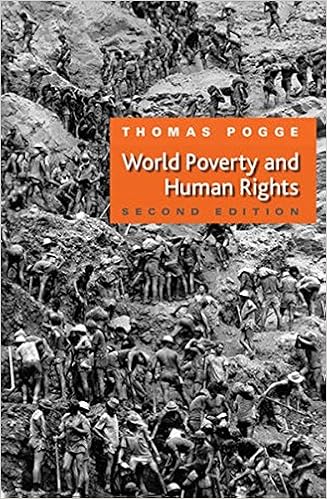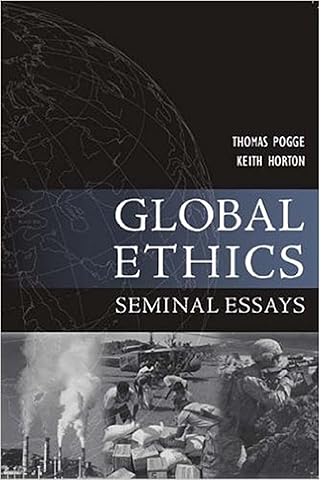World Poverty and Human Rights: Thomas W. Pogge: 9780745641447: Amazon.com: Books
World Poverty and Human Rights 2nd Edition
by Thomas W. Pogge (Author)
4.6 out of 5 stars 4 customer reviews



Global Ethics: Seminal Essays (Paragon Issues in Philosophy)
Thomas Pogge
4.5 out of 5 stars 2
Paperback-----------
Editorial Reviews
Review
"One of the most intellectually rigorous and empirically well-informed works of political philosophy yet written on world poverty. (A) brilliant work."
James Grant, Australian Journal of Political Science
"A triumph of cosmopolitan argumentation for a global system of justice. This book has been, and will remain, a standard for all students of poverty and human rights."
Human Rights Review
"If only everyone living in affluent nations were to read World Poverty and Human Rights! Pogge's combination of rigorous moral argument and judicious use of the relevant facts compels us to acknowledge that the existing global economic order is ethically indefensible. A wonderful book that could do an immense amount of good."
Peter Singer
"One of the very best books known to me on global inequality, the most important moral problem facing the world today. Pogge shows convincingly how we, and the institutions we support, can best try to make the present world order less unjust. These proposals combine, in a remarkable way, moral depth, clear thinking, inventiveness, and practical good sense."
Derek Parfit, All Souls College, Oxford
"Pogge's gift is to recognize as imaginary the boundaries between economics and ethics. A striking example is the historically derived and currently dysfunctional way we apply patents for medicines. With simplicity and clarity, Pogge offers an analysis without villains, a remedy without losers and a practical path to fundamental reform."
Carl Nathan, Cornell University
Read more
From the Back Cover
Some 2.5 billion human beings live in severe poverty, deprived of such essentials as adequate nutrition, safe drinking water, basic sanitation, adequate shelter, literacy, and basic health care. One third of all human deaths are from poverty-related causes: 18 million annually, including over 10 million children under five.
However huge in human terms, the world poverty problem is tiny economically. Just 1 percent of the national incomes of the high-income countries would suffice to end severe poverty worldwide. Yet, these countries, unwilling to bear an opportunity cost of this magnitude, continue to impose a grievously unjust global institutional order that foreseeably and avoidably perpetuates the catastrophe. Most citizens of affluent countries believe that we are doing nothing wrong.
Thomas Pogge seeks to explain how this belief is sustained. He analyses how our moral and economic theorizing and our global economic order have adapted to make us appear disconnected from massive poverty abroad. Dispelling the illusion, he also offers a modest, widely sharable standard of global economic justice and makes detailed, realistic proposals toward fulfilling it.
Thoroughly updated, the second edition of this classic book incorporates responses to critics and a new chapter introducing Pogge's current work on pharmaceutical patent reform.
-------------
Paperback: 304 pages
Publisher: Polity; 2 edition (February 26, 2008)
------------------
Top customer reviews

Boris Yakubchik
5.0 out of 5 starsMUST READ!September 21, 2013
Format: Paperback|Verified Purchase
This book blew me away. I'm well-versed in philosophy and the arguments presented were superb!
Not only does Pogge bring new arguments, he has done an impressive amount of research.
He brings strong arguments that people in the developed countries ought to help the world's poorest. He concludes with explicit proposals for significantly decreasing extreme poverty and the gash inequalities present today.

William Podmore
5.0 out of 5 starsExcellent study of our moral responsibilityApril 29, 2010
Format: Hardcover
In 2004, 2.5 billion people, 40 per cent of humanity, were living in severe poverty. Every year, 18 million people, a third of all who die, die early from poverty-related causes.
In this brilliantly original study, Thomas Pogge, Professor of Philosophy and International Affairs at Yale University, shows how the rich countries' governments' policies cause the poverty. The world order they impose `foreseeably produces an avoidable massive human rights deficit'.
One reviewer called this book `an analysis without villains', but in fact Pogge shows that our governments, corporations and `those who represent us in WTO negotiations and at the IMF' are true villains. Doing harm foreseeably and avoidably is morally indefensible.
The shortfall is just $300 billion a year, less than one per cent of the rich countries' total gross national incomes. The rich countries' subsidies to their richest farmers were $300 billion in 2005. Their tariffs on manufactured imports from poor countries are four times higher than on those from other rich countries. In 2005, just $7.63 billion of the total $106.78 billion of aid went to basic social services - 0.02 per cent of the rich countries' combined GNP.
Pogge explains that we cannot excuse ourselves by blaming the poor countries or their rulers because "the national causal factors we most like to highlight - tyranny, corruption, coups d'état, civil wars - are encouraged and sustained by central aspects of the present global economic order." The IMF, the World Bank and the EU demand privatisation, which, as he points out, is a way for rulers to enrich themselves by selling public property: "the sale of public property really is an important causal contributor to the incidence of undemocratic government."
We are implicated because we let our rulers do this great harm to the poor. Pogge asks, why don't we find ending this poverty morally compelling? He exposes the self-deceptions that make this glaring injustice possible.
We should never endorse injustice, or give our vote to those who practise it. We have to take responsibility, take control, and end the poverty by ending the villainy.
Read less
No comments:
Post a Comment
Note: Only a member of this blog may post a comment.